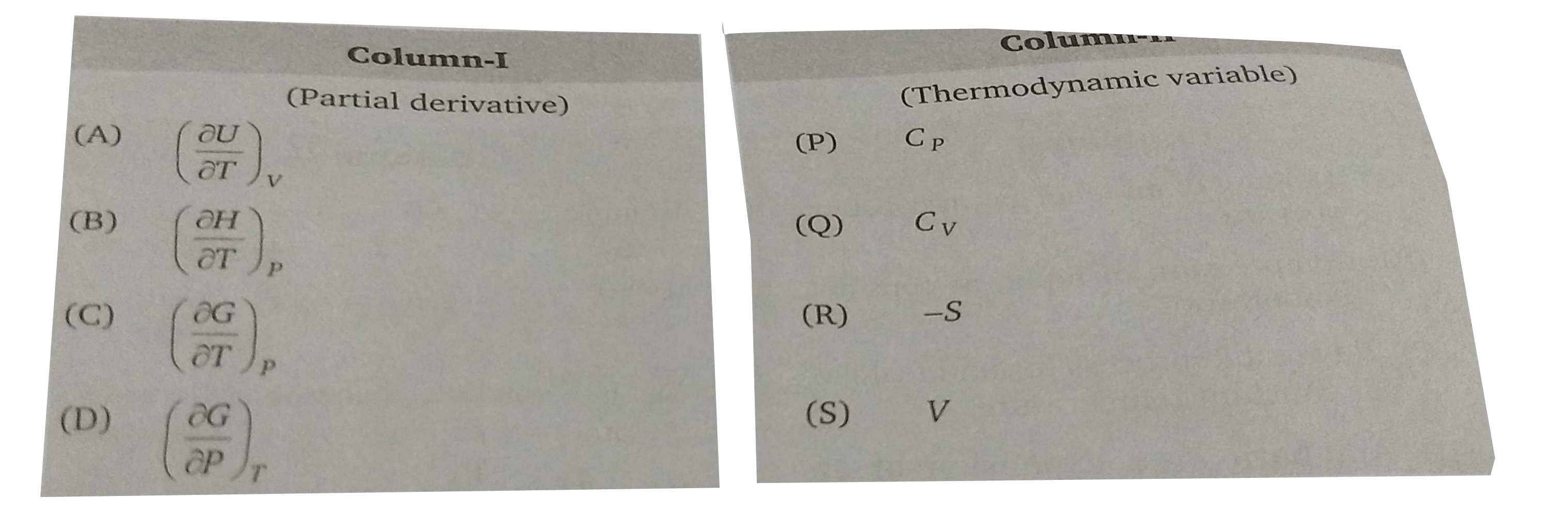The standard enthalpy of formation of gaseous H2O at 298 K is −241.82 kJ/mol. Calculate ΔH∘ at 373 K given the following values of the molar heat capacities at constant pressure :
H2O(g)=33.58 JK−1 mol−1, H2(g)=29.84 JK−1 mol−1, O2(g)=29.37 JK−1 mol−1
Assume that the heat capacities are independent of temperature : Solution in Punjabi
−242.6kJ/mol
−485.2kJ/mol
−121.3kJ/mol
−286.4kJ/mol
The correct Answer is:A
ΔrC∘p=−10.945 for
H2(g)+12O2(g)→H2O(g)
According to Kirchhoff's law
ΔrH∘T2−ΔrH∘T1=ΔrC∘p[T2−T1]
ΔrH∘T2−(241.82)=[−10.94J(373−298)/100]
⇒ΔrHT2=−242.6 kJ/mol
Topper's Solved these Questions
- THERMODYNAMICSBOOK - NARENDRA AWASTHICHAPTER - THERMODYNAMICSEXERCISE - Level 3 - One Or More Answers Are Correct
1 Video
- THERMODYNAMICSBOOK - NARENDRA AWASTHICHAPTER - THERMODYNAMICSEXERCISE - Level 3 - Match The Column
2 Videos
- THERMODYNAMICSBOOK - NARENDRA AWASTHICHAPTER - THERMODYNAMICSEXERCISE - Level 2 (Q.1 To Q.30)
1 Video
- STOICHIOMETRYBOOK - NARENDRA AWASTHICHAPTER - STOICHIOMETRYEXERCISE - Level 3 - Subjective Problems
20 Videos
Similar Questions
Assume ideal gas behaviour for all the gases considered and neglect vibrational degrees of freedom. Separate equimolar sample. Separate equimolar samples of Ne, O2 , CO2 and SO2 were subjected to a two process as mentioned. Initially all are at same state of temperature and pressue.
Step I → All undergo reversible adiabatic expansion to attain same final volume, which is double the original volume thereby causing the decreases in their temperature.
Step → After step I all are given appropriate amount of heat isochorically to restore the original temperature.
Mark the correct option(s) :
View SolutionMatch the following columns

View SolutionWrite structure of 2,2-dimethylheptane.
View SolutionWhat volume of a liquid (in L) will contain 10 mole ? If molar mass of liquid is 280 and its density is 1.4 g/mL.
View SolutionThe standard enthalpy of formation of gaseous H2O at 298 K is −241.82 kJ/mol. Calculate ΔH∘ at 373 K given the following values of the molar heat capacities at constant pressure :
H2O(g)=33.58 JK−1 mol−1, H2(g)=29.84 JK−1 mol−1, O2(g)=29.37 JK−1 mol−1
Assume that the heat capacities are independent of temperature :
View SolutionGiven C_(2)H_(2)(g)+H_(2)(g)rarrC_(2)H_(4)(g): DeltaH^(@)=-175 " kJ mol"^(-1) DeltaH_(f(C_(2)H_(4),g))^(@)=50 " kJ mol"^(-1), DeltaH_(f(H_(2)O,l))^(@)=-280 " kJ mol"^(-1), DeltaH_(f(CO_(2)g))^(@)=-390 " kJ mol"^(-1) If DeltaH^(@) is enthalpy of combustion (in kJ "mol"^(-1) ) of C_(2)H_(2) (g), then calculate the value of |(DeltaH^(@))/(257)|
View SolutionThe standard molar entropy of H2O(l) is 70JK−1mol−1.Will the standard molar entropy of H2O(s) be more or less than 70JK−1mol−1?
View SolutionWhat is the value of change in internal energy at 1 at, in the process H_(2)O (l, 323 K) rarr H_(2)O (g, 473 K) Given : C_(p) (H_(2)O, l)=75.3 JK^(-1) mol^(-1) , C_(p) (H_(2)O, g)=33.314 JK^(-1) mol^(-1), DeltaH_(vap) at 373 K=40.7 kJ//mol
View SolutionThe standard enthaply for the reaction H_(2)(g) + 1//2 O_(2)(g) to H_(2)O(l) is - 285.76 kJ at 298 K. Calculate the value of DeltaH at 373 K .The molar heat capcities at constant pressure (C_(P)) in the given temperature range of H_(2)(g),O_(2)(g) and H_(2)O(l) are respectively 38.83,16 and 75.312 JK^(-1) mol^(-1) .
View SolutionGiven the following entropy values ( in JK^(-1) "mol"^(-1) ) at 298 K and 1 atm: H_(2)(g):130.6, Cl_(2)(g):223.0, HCl(g): 186.7 . The entropy change (in JK^(-1) "mol"^(-1) ) for the reaction H_(2)(g) + Cl_(2)(g) to 2HCl(g) , is
View SolutionGiven the following entropy values (in JK^(-1)"mol"^(-1)) at 298 K atm : H_(2)(g):130.6.Cl_(2)(g):223.0andHCl(g): 186.7 . The entropy change (in JK^(-1)"mol"^(-1)) for the reaction H_(2)(g)toCl_(2)(g)to2HCl(g) is
View SolutionCalculate the standard entropy change for the following reaction : H_(2)(g) + Cl_(2)(g) rarr 2HCl(g) at 298 K Given S_(H_(2))^(@) = 131J K^(@) mol^(_1), S_(Cl_(2))^(@) = 223 JK^(-1) mol^(-1) and S_(HCl)^(@) =187 JK^(-1) mol^(-1)
View SolutionThe standard molar entropy of H_(2)O(l) is 70 JK^(-1) mol^(-1) . Will the standard molar entropy of H_(2)O(s) be more, or less than 70 JK^(-1) mol^(-1) ?
View Solution298K पर अभिक्रिया 2H2O(l)⇔2H2(g)+O2(g) के लिए साम्य स्थिरांक की गणना कीजिए । दिया हुआ है - ΔfG∘[H2O(l)]=−237.2kJmol−1 तथा R=8.314JK−1mol−1.
View SolutionThe standard enthalpy of formation of gaseous H2O at 298 K is −241.82 kJ/mol. Calculate ΔH∘ at 373 K given the following values of the molar heat capacities at constant pressure :
H2O(g)=33.58 JK−1 mol−1, H2(g)=29.84 JK−1 mol−1, O2(g)=29.37 JK−1 mol−1
Assume that the heat capacities are independent of temperature :
View SolutionGiven the following entropy values (in JK−1mol−1) at 298 K atm : H2(g):130.6.Cl2(g):223.0andHCl(g):186.7 . The entropy change (in JK−1mol−1) for the reaction
H2(g)+Cl2(g)→2HCl(g)is
View Solution
